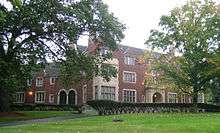Michael Gallagher (bishop)
Michael James Gallagher (November 16, 1866 in Auburn, Michigan – January 20, 1937) was the Roman Catholic bishop of the Diocese of Detroit from 1918 to 1937.
| Styles of Michael James Gallagher | |
|---|---|
 | |
| Reference style | The Most Reverend |
| Spoken style | Your Excellency |
| Religious style | Bishop |
| Posthumous style | not applicable |
His Excellency, The Most Reverend Michael James Gallagher | |
|---|---|
| Bishop of Detroit | |
| See | Detroit |
| In office | November 18, 1918 – January 20, 1937 |
| Predecessor | John Samuel Foley |
| Successor | Edward Aloysius Mooney |
| Orders | |
| Ordination | March 19, 1893 by Henry Richter |
| Consecration | September 8, 1915 by Henry Richter |
| Personal details | |
| Born | November 18, 1866 Auburn, Michigan |
| Died | January 20, 1937 (age 70) Detroit, Michigan |
| Nationality | American |
| Denomination | Catholic Church |
Career
Gallagher was ordained a priest for the diocese of Grand Rapids, Michigan on March 19, 1893. On July 5, 1915, he was appointed titular bishop of Tipasa and coadjutor of Grand Rapids. On December 26, 1916, he was appointed bishop of Grand Rapids. On July 18, 1918, Gallagher was appointed bishop of Detroit, where he served until his death in 1937.[1]
In 1926, Gallagher appointed Charles Coughlin as parish priest in Royal Oak. Coughlin's popular radio broadcasts raised funds for the building of National Shrine of the Little Flower in the parish, but his increasingly political and antisemitic content grew controversial. Although the Vatican, the Nunico, and the Archbishop of Cincinnati all wanted Coughlin silenced, they recognized that only Gallagher, as Coughlin's ordinary, had the canonical authority to do so, which he declined to exercise.[2]
Residence
The Fisher Brothers of the firm Fisher Body in Detroit commissioned the Boston firm of McGinnis and Walsh, specialists in ecclesiastical architecture, to design a residence for Bishop Gallagher.[3][4] The 39,000-square-foot (3,600 m2) home, paid for by the Fishers, is the largest within the city of Detroit.[3]

The two-story brick residence, a large central structure flanked by diagonal wings.[3] Religious themes are included throughout the house, both on the exterior and the interior.[3] On the exterior, medallions, shields and crests are set into the brickwork, and a copper statue of the St. Michael the Archangel defeating Satan is prominent.[3] The interior is finished with oak, stone and masonry. The house had, at one time, the largest collection of Pewabic glazed pottery tile in Michigan.[3]
Gallagher lived in this home until his death in 1937; subsequent archbishops of Detroit Edward Mooney and John Francis Dearden also lived in the home.[3]
See also
- Archdiocese of Detroit
References
- "Bishop Michael James Gallagher". Catholic-Hierarchy.org. David M. Cheney. Retrieved 21 January 2015.
- Boyea, Earl (1995). "The Reverend Charles Coughlin and the Church: the Gallagher Years, 1930-1937". Catholic Historical Review. 81 (2): 211–225.
- Bishop's Residence Archived 2018-10-06 at the Wayback Machine from Detroit1701.org
- McDonald, Maureen (November 28, 2006).Visit with a Giant. Model D Media. Retrieved on December 23, 2008.
| Catholic Church titles | ||
|---|---|---|
| Preceded by Henry Richter |
Bishop of Grand Rapids 1916–1918 |
Succeeded by Edward D. Kelly |
| Preceded by John Samuel Foley |
Bishop of Detroit 1918–1937 |
Succeeded by Edward Mooney |

